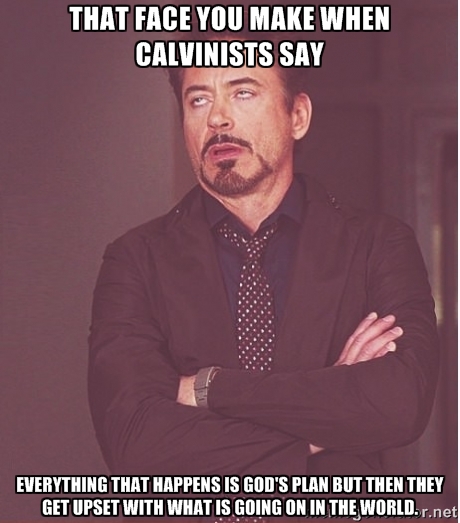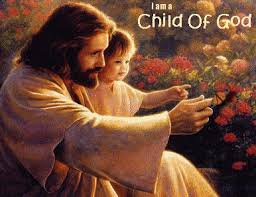 Ty han skall bli stor inför Herren. Vin och starka drycker skall han inte dricka, och redan i moderlivet skall han bli uppfylld av den helige Ande – Lukas 1:15
Ty han skall bli stor inför Herren. Vin och starka drycker skall han inte dricka, och redan i moderlivet skall han bli uppfylld av den helige Ande – Lukas 1:15
Ovan vers innehåller ingen information om någon utkorelse, eller att bebisar har ett medvetande om rätt och fel. Historien börjar med att Sakarias får ett möte av en ängel som deklarerar att Sakarias ska få en son som han ska ge namnet JOHANNES. Ängeln ger honom lite beskrivningar om hur Johannes liv kommer att utspela sig (stor inför Gud och ingen förtäring av starka drycker) och en del översättningar får det sedan till att Johannes skulle bli uppfylld av den helige Ande redan i moderlivet. Det är en möjlig översättning av grekiskan, men inte den rakaste översättningen. Den engelska KJV (och även NIV och en del andra) har en bättre översättning. NIV översätter t o m att Johannes kommer att få den helige Ande från FÖDELSEN och inte från moderlivet.
Lukas 1:13 Men ängeln sade till honom: “Frukta inte, Sakarias. Din bön har blivit hörd. Din hustru Elisabet skall föda en son åt dig, och du skall ge honom namnet Johannes. 14 Du skall få fröjda dig och jubla, och många kommer att glädja sig över hans födelse. 15 Ty han skall bli stor inför Herren. Vin och starka drycker skall han inte dricka, och redan i moderlivet skall han bli uppfylld av den helige Ande.
KJV: 15 he shall be filled with the Holy Ghost, even FROM his mother’s womb.
NIV: and he will be filled with the Holy Spirit even FROM BIRTH
πλησθήσεται (he will be filled ) ἔτι (yet, while, still) ἐκ (out, while in, coming from, out of) κοιλίας (womb) μητρὸς (of mother) αὐτοῦ (of him)
Betydelsen att komma UT från magen, resulterar i att det tidigaste ögonblicket som Johannes skulle kunna ha blivit fylld av den helige Ande är när han kommit ut från moderlivet, men det står inte preciserat hur lång tid efter det ögonblicket som händelsen inträffade. Bara att det var någon gång efter utkomsten ur magen. Om Lukas hade velat säga att Johannes var fylld av den helige Ande medan han var kvar i moderlivet så skulle han kunna ha valt prepositionen “en”.
Ovan skulle alltså kan leda till förslaget att Johannes skulle komma att bli fylld av den helige Ande från födseln/födsloögonblicket/moderlivet, vilket i sin tur mycket väl skulle kunna handla om ett IDIOM/uttryck. Även på svenska skulle man utan att bli missförstådd kunna säga “Evert har varit aktiv och gillat sportaktiviteter hela sitt liv – sedan födseln”, eller “Maja har sedan födseln varit huslig och älskat att baka och laga mat”. Man vill alltså ge uttryck för att de från start/början (så fort de haft kapaciteten) haft en sådan inriktning, men eftersom det är ett idiom/uttryck så behöver man inte mena att det bokstavligt talat handlar om just den minut på förlossningsavdelningen då de föds ut från livmodern. “Från barnsben” är ett mer vanligt svenskt uttryck som visserligen inte säger samma sak (från födseln) men som ger en fingervisning om att det finns uttryck i våra språk som är lite diffusa men som ändå inte misstolkas om man skulle använda dem. Jag tror de flesta språk har liknande uttryck när de vill berätta om något som varat från tidig ålder och/eller så fort kapaciteten fanns.
Så Lukas 1:15 kan inte användas som bevis för att vare sig Johannes eller bebisar i allmänhet är fyllda av den helige Ande redan i magen, och om man vill göra gällande att den helige Ande åtminstone ges när man kommer UT från magen så är det ändå inget stöd för arvsynden som lär att man är fördärvad pga Adams synd redan vid befruktningen (såvida man inte tror att ofödda barn inte är människor.) Versen är inte klar över när den helige Ande ges till Johannes (ögonblicket när han föds, eller senare), men det är viktigt att förstå hur den helige Ande verkar i det gamla och det nya testamentet.
Den helige Ande verkar på olika sätt i det Gamla och i det Nya testamentet, även om det är samma Ande
Johannes Döparen var en profet under det gamla testamentet. Hela hans liv utspelade sig innan Jesus dog på korset, och innan det utlovade löftet om den helige Ande (i de kristnas kroppsliga tempel) utkristalliserades. På det gamla testamentets tid så bodde inte den helige Ande i de troendes kroppar på det sätt som de gör idag, men däremot kunde den helige Ande tillfälligt besöka personer speciellt om de var öppna för det, och det kunde även ske utan deras medverkan. Det handlade alltså om Guds närvaro (och Guds närvaro påverkar människor), men det handlade inte om ett tecken på att man var frälst utan snarare så kunde Anden komma över en gudsman (vanligtvis) för att han skulle profetera något viktigt från Gud, och/eller för att ge viktiga gudomliga instruktioner. Vidare så var Guds närvaro starkt kopplat till individens eget agerande och nivå på ödmjukhet och sökande, fast inte alltid. Här nedan kommer exempel på Andens närvaro i GT, och notera att närvaro av den helige Ande inte likställdes med att personen i fråga var för evigt frälst.
2 Mos. 31:1 Herren sade till Mose: 2 Se, jag har kallat Besalel, son till Uri, son till Hur av Juda stam. 3 Jag har fyllt honom med Guds Ande, med vishet och förstånd, med kunskap och med skicklighet i allt slags hantverk, 4 så att han kan tänka ut konstfulla arbeten och utföra dem i guld, silver och koppar, 5 slipa stenar för infattning och snida i trä, ja, utföra alla slags arbeten.
4 Mos. 11:16 Då sade Herren till Mose: “Kalla samman sjuttio män av de äldste i Israel, sådana som du vet är folkets äldste och dess tillsyningsmän bland folket. För fram dem till uppenbarelsetältet och låt dem ställa sig där hos dig. 17 Där skall jag då stiga ner och tala med dig, och jag skall ta av den Ande som är över dig och låta den komma över dem. De skall tillsammans med dig bära bördan av folket, så att du slipper bära den ensam.18 Säg till folket: Helga er till i morgon, så skall ni få kött att äta. Ni har gråtit inför Herren och sagt: Vem skall ge oss kött att äta? I Egypten hade vi det så bra. Därför skall nu Herren ge er kött att äta. 19 Ni skall få äta, inte bara en dag, inte två dagar, inte fem dagar, inte tio dagar, inte tjugo dagar, 20 utan en hel månad, ända tills köttet kommer ut genom näsan på er och det äcklar er. Ty ni har förkastat Herren som är mitt ibland er, och gråtit inför hans ansikte och sagt: Varför drog vi alls ut ur Egypten?”—24 Mose gick ut och talade om för folket vad Herren hade sagt. Och han kallade samman sjuttio män av de äldste i folket och lät dem ställa sig runt omkring tältet. 25 Då steg Herren ner i molnskyn och talade till honom, och tog av den Ande som var över honom och lät den komma över de sjuttio äldste. Då nu Anden vilade över dem började de profetera, men det gjorde de sedan inte mer 26 Två män hade stannat kvar i lägret. Den ene hette Eldad och den andre Medad. Också över dem vilade Anden, ty de var bland de uppskrivna, men de hade ändå inte gått ut till tältet. Och de profeterade i lägret. 27 Då skyndade en ung man bort och berättade för Mose: “Eldad och Medad profeterar i lägret.” 28 Josua, Nuns son, som hade varit Moses tjänare från sin ungdom, sade då: “Mose, min herre, förbjud dem!” 29 Men Mose sade till honom: “Nitälskar du för mig? Om ändå allt Herrens folk blev profeter genom att Herren lät sin Ande komma över dem!”
4 Mos. 24:1 När Bileam såg att det behagade Herren att välsigna Israel, gick han inte som förut bort och såg efter spåtecken, utan vände sig mot öknen. 2 Och när Bileam höjde blicken, såg han Israel i sina läger efter sina stammar. Och Guds Ande kom över honom. 3 Då framförde han detta budskap:—12 Bileam svarade Balak: “Sade jag inte till sändebuden som du skickade till mig:13 Även om Balak skulle ge mig så mycket silver och guld som hans palats rymmer, kan jag ändå inte överträda Herrens befallning av egen vilja i vare sig gott eller ont. Vad Herren säger, det måste jag tala.
Domarboken 6:33 Midjaniterna, amalekiterna och österlänningarna hade alla samlats och gått över Jordan och slagit läger i Jisreels dal. 34 Men Herrens Ande kom över Gideon. Han stötte i hornet, och abiesriterna samlades och följde honom.
2 Krön. 24:19 Och profeter blev sända till dem för att få dem att vända om till Herren, och dessa varnade dem, men de lyssnade inte till dem.20 Men Sakarja, prästen Jojadas son, hade blivit beklädd med Guds Andes kraft. Han trädde fram inför folket och sade till dem: “Så säger Gud: Varför överträder ni Herrens bud? Det kan inte sluta lyckligt. Eftersom ni har övergivit Herren, har han också övergivit er.”
1 Sam. 19:20 Då sände Saul dit några män för att hämta David. Men när männen fick se skaran av profeter som profeterade och fick se Samuel stå där som deras anförare, kom Guds Ande över dem så att också de profeterade.
Här nedan vet vi inte hur långt “framöver” räcker sig, men Davids långa och svåra synd ihop med Bat-Seba utspelar sig efter händelsen i denna vers. Att ha fått del av den helige Ande är alltså inget tecken på att man är för evigt frälst och/eller att man alltid väljer att undvika synd:
1 Sam. 16:13 Då tog Samuel sitt oljehorn och smorde honom mitt ibland hans bröder. Och Herrens Ande kom över David från den dagen och framöver. Sedan steg Samuel upp och gick till Rama.
Ängeln förklarade för Maria att den helige Ande skulle komma över henne och ge henne kraft, men det betyder inte att Maria var ofrälst innan detta ögonblick. Maria kan mycket väl ha blivit vald som kandidat för att föda Guds son just pga hennes eget ödmjuka hjärta. Händelsen utspelar sig under det gamla testamentet:
Lukas 1:35 Ängeln svarade henne: “Den helige Ande skall komma över dig, och den Högstes kraft skall vila över dig. Därför skall också barnet kallas heligt och Guds Son.
Här nedan är den berömda vers där Jesus lovar sina lärljungar att de om några dagar skulle bli döpta i den helige Ande. Inte heller de var “otroende” innan detta ögonblick, men den helige Ande gav dem ändå extra KRAFT från Gud, vilket de behövde för att framgångsrikt sprida Guds ord. Denna gudskraft ges inte till vem som helst under det nya testamentet utan de som omvänt sig och tror på Jesus:
Apg 1:4 Vid en måltid tillsammans med apostlarna befallde han dem: “Lämna inte Jerusalem utan vänta på vad Fadern har utlovat, det som ni har hört av mig. 5 Ty Johannes döpte med vatten, men ni skall om några dagar bli döpta i den helige Ande.” 8 Men när den helige Ande kommer över er, skall ni få kraft och bli mina vittnen i Jerusalem och i hela Judeen och Samarien och ända till jordens yttersta gräns.”
Apg. 2:Petrus svarade dem: “Omvänd er och låt er alla döpas i Jesu Kristi namn, så att era synder blir förlåtna. DÅ skall ni få den helige Ande som gåva.
Agabus var också en individ som levde under det nya testamentet, och som förutspådde framtiden tack vare den helige Anden:
Apg 11:28 En av dem som hette Agabus trädde fram, och genom Anden förutsade han att en svår hungersnöd skulle komma över hela världen. – Den kom också under Claudius regering.
Här nedan är också en händelse från det nya testamentet, där en sådan kraft, som den Jesus utlovade, manifesteras genom tungotal och profeterande:
Apg 19:6 Och när Paulus lade händerna på dem, kom den helige Ande över dem, och de talade med tungor och profeterade.
Om man menar att människor som lever i det gamla testamentet inte är frälsta förrän Anden är över dem, så blir det bekymmer med Jesus Kristus, för vi kan läsa om när Anden kom ner över honom som en duva. Var Jesus inte en ren människa innan detta tillfälle? (Jesus döpte sig inte pga omvändelse från några synder, utan som ett startskott för oss andra och som ett tecken.)
Markus 1:10 Och se, när han steg upp ur vattnet, såg han himlen dela sig och Anden komma ner över honom som en duva.
När ljudet av din hälsning nådde mina öron, spratt barnet till i mig av glädje?
Lukas 1:41 När ELISABETH HÖRDE Marias hälsning, spratt barnet till i HENNES moderliv, och HON blev uppfylld av den helige Ande 42 och ropade med hög röst: “Välsignad är du bland kvinnor, och välsignad är din livsfrukt! 43 Men varför händer detta mig, att min Herres mor kommer till mig? 44 Se, när ljudet av din hälsning nådde MINA ÖRON, spratt barnet till i mig av glädje.
För Elisabeth måste mötet med Maria ha varit omvälvande, och det kan ibland kännas som att man får bubblande fjärilar i magen vid enorma nyheter eller händelser. Adrenalitet skulle i sin tur kunna påverka barnet rent reflexmässigt eftersom det ju befinner sig i magen. Händelsen verkar hela tiden beröra Elisabeths perspektiv, och förtfattaren Lukas återger det som Elisabeth säger med sina egna ord. Vi kan läsa att det var Elisabeth (inte barnet) som HÖRDE, och hennes hörande var upprinnelsen till att barnet spratt till. I v. 41 står det inte att barnet på något sätt hade ett eget medvetande, och enligt Rom. 9:11 så kan barn inte heller skilja mellan gott och ont. Men hur är det med informationen i v. 44; att barnet spratt till av glädje? Är inte det ett tecken på att barnet kan uppleva något och att det har ett slags vuxet medvetande? Nej, grekiskan säger bara att det var pga en glädje (står inte vems) som barnet spratt till. “Av glädje” (Elisabeths glädje) spratt barnet till! Elisabeth sa ju själv i v. 41 att hon HÖRDE Marias hälsning och att hon då blev uppfylld av den helige Ande, vilket absolut kan ha varit så omvälvande för henne att hennes mage bubblade och barnet i hennes mage spratt till av (hennes) glädje. Det kan också ha varit ett gudomligt ögonblick som Gud åstadkom för att ge Elisabeth ytterligare ett tecken på att hon verkligen hade en mycket viktig person i hennes mage, och som hon hade all anledning att glädja sig åt.
En mamma kan inte kommunicera med sitt ofödda barn, och därför är det svårt att tänka sig att Elisabeth frågade sitt nyfödda barn “Jag kände att du spratt till precis när jag själv uppfylldes av glädje, förundran och kraft, och nu undrar jag om du spratt till av glädje, eller om du spratt till av någon annan orsak?” Hur skulle den nyfödda bebisen kunna svara på en sådan fråga? Men Elisabeth verkade ändå säker på att GLÄDJE var orsaken till att bebisen spratt till, och skälet att hon kunde vara så säker beror nog på att det var hennes egen glädje som det handlade om, och som gav återverkningar på barnet.
En del drar ganska stora växlar av löftet att barnet skulle få den helige Ande (någon gång efter att han kommit ut ur moderlivet) samt att det spratt till pga (någons) glädje. De menar att det betyder ungefär (det måste inte vara “allt eller inget” från listan):
- det måste absolut handla om barnets egen glädje
- det måste absolut betyda att Johannes som ofödd kunde TRO, tänka, resonera, och välja mellan gott och ont
- eftersom Johannes kunde tro, tänka och resonera så måste det betyda att ALLA bebisar kan göra det i magen
- eftersom Johannes hade ett medvetande så måste det betyda att ALLA bebisar har ett medvetande som de kan synda med, och då måste arvsynden vara sann eftersom det som hände Johannes måste hända ALLA bebisar
- eftersom han blev fylld av den helige Ande i moderlivet så måste det betyda att han var FRÄLST redan som ofödd
- eftersom Johannes blev fylld med den helige Ande i moderlivet, så måste det betyda att han var en av de UTVALDA, medan andra bebisar tillhör de EJ utvalda och som Gud inte vill ska bli frälsta
- eftersom Johannes var frälst som ofödd måste det betyda att Gud bestämmer vem som ska bli frälst/ofrälst redan vid födseln













